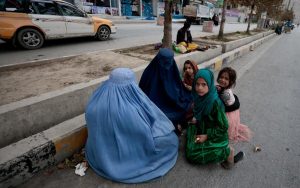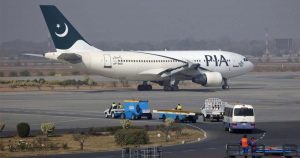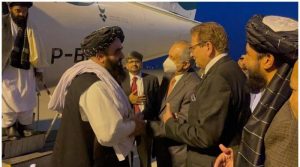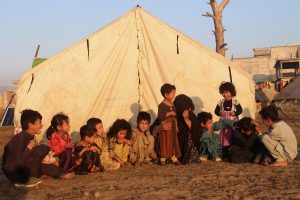Million Afghan children at risk of dying
China resumes trade with Afghanistan
Flights begin from Kabul to Islamabad
14-11-2021
By SJA Jafri + Bureau Report + Agencies
 KABUL/ ISLAMABAD/ GENEVA/ BEIJING: Interim Afghan Foreign Minister Amir Khan Muttaqi on Friday said that Afghanistan hopes that the temporary ceasefire deal reached between Pakistan and the banned Tehreek-e-Taliban Pakistan (TTP) turns into lasting peace.
KABUL/ ISLAMABAD/ GENEVA/ BEIJING: Interim Afghan Foreign Minister Amir Khan Muttaqi on Friday said that Afghanistan hopes that the temporary ceasefire deal reached between Pakistan and the banned Tehreek-e-Taliban Pakistan (TTP) turns into lasting peace.
Yesterday, Federal Minister for Information and Broadcasting Fawad Chaudhry announced that the government of Pakistan and the banned outfit have reached a “complete ceasefire” during peace talks.
Today, while addressing a seminar at Institute of Strategic Studies Islamabad during his visit to the federal capital, Muttaqi confirmed his role in mediating peace talks between both sides.
Muttaqi was specially invited by Pakistan to attend the ninth session of Troika Plus meeting held in Islamabad.
The acting Afghan foreign minister said that his country hopes there is further progress in the coming days in negotiations between the two sides.
Muttaqi claimed that Afghan soil is not being used against Pakistan.
“Currently, there are no anti-Pakistan elements present in Afghanistan,” he said.
 The minister said that they “cannot figure out what to do in order to get recognition” for the Taliban regime from the US and the rest of the world.
The minister said that they “cannot figure out what to do in order to get recognition” for the Taliban regime from the US and the rest of the world.
“Our government is broad-based,” Muttaqi said, adding that the Taliban government is “inclusive of all ethnic groups”.
He assured the participants of the seminar that women are back “100%” to work in the health sector and associated institutions, while 75% female employees have resumed work at educational institutes.
Speaking about the Afghan army, Muttaqi said Afghanistan “does not need” a big army.
“We will build a small but skilled army,” the minister said.
Taliban told to uphold international obligations at Troika Plus meeting
The Troika Plus on Afghanistan was attended by special representatives of Pakistan, China, Russia and the US. The meeting asked the caretaker Afghan government to take a friendly approach towards neighboring countries.
 During the meeting, the Taliban government in Afghanistan was given a clear message to uphold its international legal obligations, including universally accepted principles of international law and fundamental human rights.
During the meeting, the Taliban government in Afghanistan was given a clear message to uphold its international legal obligations, including universally accepted principles of international law and fundamental human rights.
Addressing the Taliban, it said that it had expectations that they would take decisive action against terrorists; fulfill their commitment to prevent use of Afghan territory against its neighbors, and other countries in the region and the rest of the world.
As foreign capitals had complained of trouble distributing humanitarian aid, the Troika called on the Taliban to ensure unhindered humanitarian access, including by women aid workers, for the delivery of humanitarian assistance in Afghanistan to respond to the developing crisis.
The Taliban were also asked to work with fellow Afghans to take steps to form an inclusive and representative government that respects the rights of all Afghans and provides equal rights to women and girls to participate in all aspects of Afghan society.
In this regard, it was emphasized that access to education for women and girls at all levels is an  international obligation and the Taliban were encouraged to accelerate efforts to provide for full and equal access to education countrywide.
international obligation and the Taliban were encouraged to accelerate efforts to provide for full and equal access to education countrywide.
The Troika declared that they would continue to hold practical engagement with the Taliban to encourage the implementation of moderate and prudent policies that can help achieve a stable and prosperous Afghanistan as soon as possible.
Of particular importance was the Troika recalling the relevant Afghan-related UNSC Resolutions, including respect for the sovereignty, independence and territorial integrity of Afghanistan that is free of terrorism and drug related crime, and that contributes to regional stability and connectivity?
Meanwhile, around 3.2 million Afghan children are likely to suffer from acute malnutrition by the end of this year, with 1mn of them at risk of dying, a World Health Organization spokesperson said Friday.
“It’s an uphill battle as starvation grips the country,” Margaret Harris told Geneva-based journalists by telephone from the capital Kabul. “The world must not and cannot afford to turn its back on Afghanistan.”
 Earlier, a senior United Nations official warned that millions of Afghans, including children, could die of starvation unless urgent action is taken to pull Afghanistan back from the brink of collapse, as he called for frozen funds to be freed for humanitarian efforts.
Earlier, a senior United Nations official warned that millions of Afghans, including children, could die of starvation unless urgent action is taken to pull Afghanistan back from the brink of collapse, as he called for frozen funds to be freed for humanitarian efforts.
World Food Programme (WFP) Executive Director David Beasley told Reuters that 22.8 million people more than half of Afghanistan’s 39 million populations were facing acute food insecurity and “marching to starvation” compared to 14 million just two months ago.
“Children are going to die. People are going to starve. Things are going to get a lot worse,” he said in Dubai.
Afghanistan was plunged into crisis in August after Taliban fighters drove out a Western-backed government, prompting donors to hold back billions of dollars in assistance for the aid-dependent economy.
The food crisis, exacerbated by climate change, was dire in Afghanistan even before the takeover by the  Taliban, whose new administration has been blocked from accessing assets held overseas as nations grapple with how to deal with the hard-line Islamists.
Taliban, whose new administration has been blocked from accessing assets held overseas as nations grapple with how to deal with the hard-line Islamists.
“What we are predicting is coming true much faster than we anticipated. Kabul fell faster than anybody anticipated and the economy is falling faster than that,” Beasley said.
He said dollars earmarked for development assistance should be repurposed for humanitarian aid, which some nations have already done or frozen funds be channeled through the agency.
“You’ve got to unfreeze these funds so people can survive.”
The UN food agency needs up to $220 million a month to partially feed the nearly 23 million vulnerable people as winter nears.
Many Afghans are selling possessions to buy food with the Taliban unable to pay wages to civil servants, and urban communities are facing food insecurity on levels similar to rural areas for the first time.
WFP tapped its own resources to help cover food aid through to December after some donors failed to  meet pledges, Beasley said, adding that with government appropriations already out, funds may have to be redirected from aid efforts in other countries.
meet pledges, Beasley said, adding that with government appropriations already out, funds may have to be redirected from aid efforts in other countries.
Earlier, the Afghan flag carrier, Ariana Airlines is beginning regular twice-weekly aviation services from Kabul to Islamabad, the state-owned operator said on Thursday, joining Kam Air which has begun flying five times a week between the two cities.
Ariana, which began regular services to Dubai this week, will operate flights between Kabul and Islamabad on Thursdays and Mondays, charging $400 from Kabul and $100 from Islamabad.
Earlier this week, privately owned Kam Air started services five times a week to Islamabad as international air traffic gradually reopens following the Taliban’s seizure of power in Kabul in August.
The announcement from Ariana came as acting Foreign Minister Amir Khan Muttaqi was visiting Islamabad for talks that are expected to cover issues including aviation links between Afghanistan and Pakistan.
Some charter services have been flying to Kabul since the Taliban takeover but normally scheduled  commercial flights had been suspended.
commercial flights had been suspended.
With an economy in deep crisis and continuing concerns about Afghanistan’s future under the Taliban, there has been huge demand from people wishing to leave Afghanistan, made worse by repeated problems at land border crossings into Pakistan.
Pakistan International Airlines suspended its charter service to Kabul from Islamabad last month, citing interference from Taliban authorities, who had warned the airline it should cut its ticket prices.
On the other side, at a critical time when the doors of international trade are almost shut on Afghanistan, and as a humanitarian catastrophe looms large, China reopens trade with Afghanistan.
This month, more than 45 metric tons of pine nuts were sold by the war-ravaged country at the 4th China International Import Expo.
The Expo ran from November 5 to November 10 in Shanghai.
 The pine nuts fetched an estimated 10 million yuan ($1.56 million) for Afghanistan.
The pine nuts fetched an estimated 10 million yuan ($1.56 million) for Afghanistan.
This is the first time that the Islamic Emirate of Afghanistan has exported goods to China under the new Taliban-led government. It is important to mention here that China has yet to officially recognise the Taliban government.
According to Taliban’s spokesman Zabihullah Mujahid, Afghanistan resumed the export of pine nuts to China on Sunday (November 01), as reported by China’s Xinhua news agency.
“A cargo plane carrying pine nuts took off from the Kabul International Airport to China, after officials of the Islamic Emirate of Afghanistan inaugurated the air corridor,” Mujahid wrote on Twitter.
On the launch of the China-Afghanistan trade, the Chinese ambassador to Afghanistan Wang Yu also tweeted: “The first flight of Afghanistan’s pine nuts of this year arrived at the Pudong Airport, Shanghai, from Kabul, great job of cooperation of our 2 countries and peoples, income for Afghan farmers, nice taste for Chinese consumers, Win…Win.”
 China’s acting consul general in Lahore, Peng Zengwu, also told Geo.tv that at this juncture, when Afghanistan desperately needs global trade to avert a humanitarian crisis, “China pine nut trade with Afghanistan has injected new life in the business of Afghan traders. China will never leave the Afghan brethren people in lurch. It will continue its efforts for peace and development in Afghanistan.”
China’s acting consul general in Lahore, Peng Zengwu, also told Geo.tv that at this juncture, when Afghanistan desperately needs global trade to avert a humanitarian crisis, “China pine nut trade with Afghanistan has injected new life in the business of Afghan traders. China will never leave the Afghan brethren people in lurch. It will continue its efforts for peace and development in Afghanistan.”
Pine nut trees grow in eight eastern provinces of Afghanistan, namely Khost, Paktia, Paktika, Kapisa, Kunar, Nangarhar, Nuristan and Langham.
Separately, efforts are afoot to revive Afghanistan economy by connecting it with the China-Pakistan Economic Corridor, a signature project of China’s ambitious Belt and Road Initiative.
China also plans to relaunch trade with Afghanistan through its 46 miles shared border at the mountainous Wakhjir Pass.
However, the Wakhjir Pass is not an official crossing point. There is no road access reaching the Pass on the Afghan side, although the Pass was part of the Silk Road.
The previous Afghan government intended to build a 50 km highway through the rough terrain to access China by road for the first time in history. The project may be revived by the Taliban government.
 Pressmediaofindia
Pressmediaofindia




